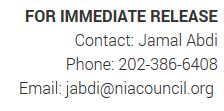“Today brings with it an historic achievement. Following more than a decade of crisis and two years of intense negotiations, the United States, other major world powers, and Iran have implemented a nuclear agreement that trades long-term constraints on Iran’s nuclear program for the lifting of U.S. and European sanctions targeting Iran. Today, for the first time in a decade, Iran’s nuclear program no longer poses a threat to the United States, and U.S. and European sanctions on Iran – which have for so long damaged Iran’s economic well-being and undermined the potential of its people – have been lifted.
“Few thought we would reach this day, but today’s events show that engagement works. Without President Obama and President Rouhani’s decision to pursue a new path in relations – one in which principled diplomacy was at the forefront of efforts to resolve the nuclear dispute – we would still be caught up in an escalatory cycle whose only logical endpoint was a new war in the Middle East. We can thank the tireless efforts of U.S. and Iranian diplomats – including and especially Secretary of State John Kerry and Foreign Minister Javad Zarif – for avoiding such an open conflict, turning an important page in the nuclear dispute, and opening up a new and promising chapter in U.S.-Iran relations.
“Engagement with Iran has succeeded where conflict could not. Without the diplomacy that augured in the nuclear agreement, Iran would have remained mere weeks from having enough weapons-grade uranium for one nuclear bomb and the U.S. would have continued to impose sanctions that crippled the aspirations of Iran’s young people. It can no longer be denied: engagement with Iran was necessary to securing American interests.“Such engagement has brought with it further success. Today, the U.S. and Iran engaged in a prisoner swap, in which five Americans have been returned to their families after a long, unjust detention in Iran. This week, U.S. Navy sailors who had drifted into Iran’s territorial waters were returned within 24 hours of being in the custody of Iranian authorities. Without the channel of communication that has been opened between the two countries and the personal rapport built up between Secretary of State John Kerry and Foreign Minister Javad Zarif, it is doubtful that this necessary and promising turn of events could have occurred. We urge both Kerry and Zarif to continue to work for the swift release of Siamak Namazi, who does not appear to be included in the swap despite earlier reports.
“Now it is time to turn engagement from the exception to the rule in U.S.-Iran relations. Having won a string of diplomatic victories, it is time for the U.S. and Iran to start to formalize diplomatic ties to ensure that this new era in relations is sustained beyond the tenure of the Obama and Rouhani administrations. Having succeeded on the nuclear issue and beyond, it is time to leverage engagement to repair a broken relationship and move beyond a lamentable past.
“To do this, the United States should consider opening up trade ties with Iran and undoing the restrictions that stymie the development of person-to-person ties between the U.S. and Iran. At a time in which Europe, Japan, and other U.S. allies are sending trade delegations to Tehran to engage their Iranian counterparts and re-integrate Iran into their own respective economies, the U.S. will be left fencing itself off from Iran through the continued imposition of its trade embargo. It is time for President Obama to test the proposition that – just as diplomatic engagement proved more constructive than continued hostilities to resolving the nuclear issue, so too will U.S. commercial engagement with Iran prove a better option for repairing relations than Washington’s self-exile from Tehran.”
News & Publications
Washington, DC – NIAC Policy Director Jamal Abdi issued the following statement ahead of the expected announcement that the parties to the Joint Comprehensive Plan of Action (JCPOA) have reached “Implementation Day,” a major milestone in which Iran has completed key nuclear concessions and the international community eases nuclear-related sanctions on Iran:
###
Back to top
